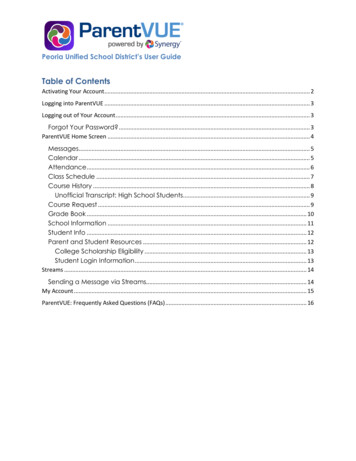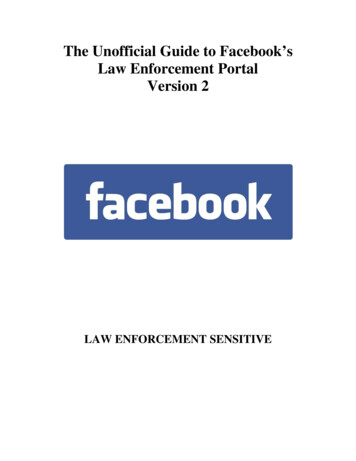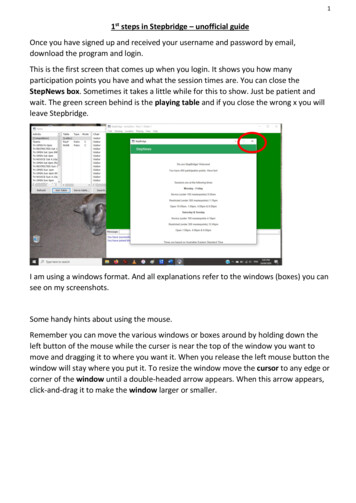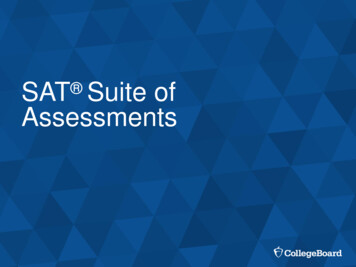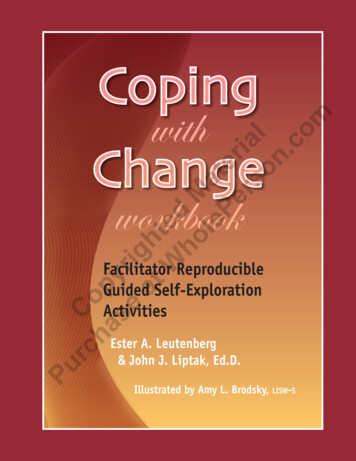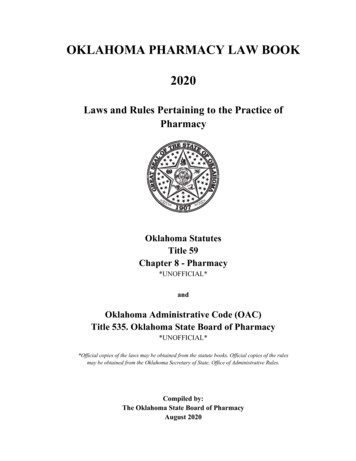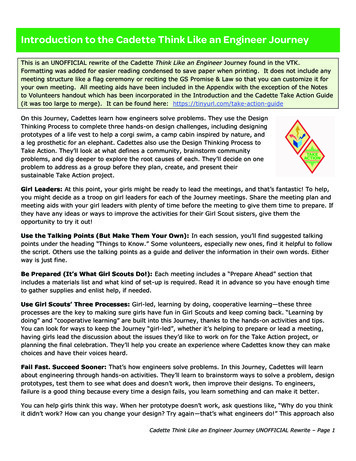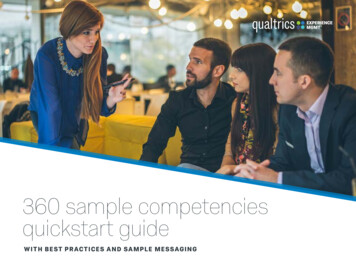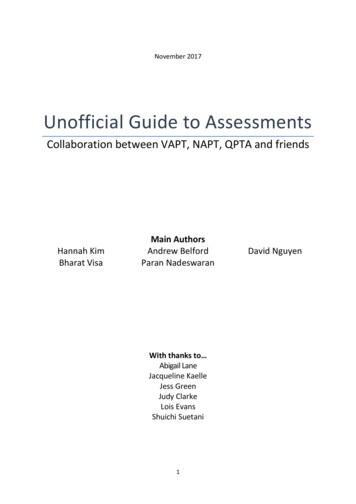
Transcription
November 2017Unofficial Guide to AssessmentsCollaboration between VAPT, NAPT, QPTA and friendsHannah KimBharat VisaMain AuthorsAndrew BelfordParan NadeswaranWith thanks to Abigail LaneJacqueline KaelleJess GreenJudy ClarkeLois EvansShuichi Suetani1David Nguyen
IntentionThis document is intended to be something that was produced for trainees by trainees. Itwas created as a result of a collaboration between VAPT, NAPT and QPTA. Our intentionsare for this "guide" to be a living document which will be updated in collaboration in thefuture.We wanted to reproduce the process that many trainees go through when they seek advicefrom their senior colleagues before they start preparing for assessments. This documenthas been produced with the understanding that currently there is less cumulativeknowledge about assessments due to the infancy of the program. This document isespecially for those trainees who work in rural and isolated areas and will likely have lesscolleagues who have attempted/passed assessments and have even less access toinformation.The hope behind this project is that we may be able to reduce the stress of the exams andassessments, and to make the fellowship process more enjoyable. We would also like to beable to pay forward what we have learned from our senior colleagues and continue thetradition of collegiality. In that spirit, please distribute to your colleagues.DisclaimerThis document is a guide only and is not intended to provide exhaustive advice on RANZCPassessments. It is a collection of personal opinions from individual trainees based on theirexperiences. It was not produced or endorsed by the RANZCP.It is recommended that trainees are familiar with the College website for up to dateinformation about assessments. Documents, Regulations, Policies and Procedures andupdates are often communicated via the training and assessment newsletters. If you areunsure, it is recommended that you seek advice from your supervisors and/or your Directorof Training.There is no financial association between this document and course providers2
ContentsPageTips for Looking After Yourself .4Formative Assessments, Timing, and General Considerations 7Scholarly Project .9Psychotherapy Written Case .10Exams: MCQ, Essay-Style, OSCEs .12MCQ .13Essay-Style. .15OSCE .17AcronymsAMA Australian Medical AssociationCAP Critical Analysis ProblemsCBFP Competency Based Fellowship ProgramCEQ Critical Essay QuestionDOT Director of TrainingEPA Entrustable Professional ActivityEMQ Extended Matching QuestionsMCQ Multiple Choice QuestionsMEQ Modified Essay QuestionsNAPT New South Wales Association of Psychiatry TraineesOSCE Observed Structured Clinical ExaminationsPWC Psychotherapy Written CaseQPTA Queensland Psychiatry Trainee's AssociationRACP Royal Australian College of PhysiciansRANZCP Royal Australian New Zealand College of PsychiatristsSIMG Specialist International Medical GraduatesSP Scholarly ProjectTRC Trainee Representative CommitteeWBA Workplace Based AssessmentVAPT Victorian Association of Psychiatry Trainees3
Tips for Looking After YourselfThe new 2012 CBFP can feel daunting, as there are many parts to complete. There are 5 centrally administeredsummative assessments (which take approximately 6-24 months to complete), in addition to the EPAs andother requirements (e.g. psychotherapy, leadership and management). There are other components withintraining that are not discussed in this document, such as the formal education course and advanced certificaterequirements. Of course, this is set within a broader context of our daily jobs, on call shifts and our personaldaily lives - the proverbial work-work-life balance.As the 2012 CBFP is new, with the first group of trainees about to transition to Fellowship, this guide aims toprovide guidance to the broader trainee group, including SIMGs and transitioned trainees. We have to bemindful of the different pathway and requirements for SIMGs and would recommend that you go to theCollege website if this is applicable to you e following are tips and resources that might be useful for trainees undergoing the process of examinationsand assessments.Tips: Consider planning for the assessments progressively during your training – a useful resource for this isthe training trajectory, which provides a recommendation as to when to complete the eeProgress-Trajectory-in-CBFP-v2-1.aspx). This may include consideration of planning for AdvancedTraining programs.When you have these in place, talk to your supports regarding this plan – it allows you to have somepeace of mind that they will support you through this process and for planning regarding cares foryour familySpeak to your supervisor and other consultants about your plan to sit for examinations andassessments – they will provide support, including possibly allocating supervision sessions to helpwith your preparation. There may be further support from the local health service with mockessays/OSCE sessions.The lifelong learning concept is useful to adopt when you start training, as this will be required for theduration of your career. Hence, learning and improving your knowledge base from the start may helpwith reducing the stress and time pressure towards the exams. The examination preparation wouldthen be further consolidation of the knowledge that has been previously obtained.Check with your local/health service/College representatives (including local trainee representativesand TRC) about resources that may be useful to help with your study – these may include past notes,organization of study groups and courses that may be usefulStudy includes self and group study - please refer to the exams section for more detail re: pros, conso Consider getting involved in a Study group for examination prep, but ensure that you getalong with them – this group will be valuable in providing advice and support, includingconstructive feedback and differing viewpoints about topicsFocus on the particulars of each assessment/examination, including being aware of the componentsof these. Be aware of the Fellowship competencies (CanMEDS), as these competencies are the focusof the exams - cies.aspxPractice as much as you can – consider taking a course if you struggle with certain aspects, includingEnglish lessons and essay writing courses/typing courses (the latter may be required when the essayexamination becomes electronic)Ensure you have some time out – make sure you have time with your family and friends – don’tneglect these people, as they will be your supports through your journey in psychiatry and your futureConsider doing enjoyable activities, a day or two, prior to the examination – it will allow you todistract from the assessment itself and give your brain some rest (e.g. have a massage, watch amovie) - avoid doing strenuous activities.4
Consider being members of your local trainee representative groups (e.g. QPTA, NAPT, VAPT etc) andother medical groups (AMA) – they provide further support for trainees in generalResources for the examinations and welfareRANZCPLocated on the College Website is the 2012 CBFP training trajectory and recommendations for progressthrough the training program. These also include the process for failing examinations, targeted learning plansand show cause. Psychiatry Training Pathway - hway.aspx College-administered assessment information - ollege-administered.aspx Targeted learning plan - llowshipProgram/Administration/TLP.aspx Process for Show Cause - llowshipProgram/Administration/SC-Process.aspxIf there are specific issues related to passing an assessment or associated remediation, consider speaking to yoursupervisors, local directors of training or your local Trainee Representative Committee member. Should you failan assessment, you should be provided with feedback regarding the assessment and communication about thenext steps in the process.For specific advice, consider contact with the Member Welfare Support Line for confidential assistance. Consideralso local doctors’ health advisory service helplines. mbers/Support-for-trainees-and-SIMGs.aspxThe College has further released Webinars, Congress Workshops, and e-modules to help with passing exams: Webinars /Webinars.aspx) e.g. Training Programbasics, Psychotherapy Written Case, Navigating the Scholarly Project E-module learnit – Guide to critical essay question Congress workshops – CEQ, MEQ, OSCEAMAThe AMA have been advocates for Doctors in Training – they have provided multiple resources to help withmanaging your and colleagues care during training. These include: General information - https://ama.com.au/resources/doctors-in-training Website to promote health of junior doctors – focuses on self-assessment and problems facingtrainees. Provides vignettes, advice to reduce stress and where to find help - http://jmohealth.org.au/ General information for wellbeing for junior doctors JMOs Jan2016.pdf Resilience resources for registrars and trainees - http://www.rcubed.org.au/ Consider liaising with your medicolegal supports regarding welfare resources (i.e. MDA National) on/Doctors-in-TrainingRACPThe RACP provides further support for their trainees and offers free resources to all trainees (indiscriminate ofspecialty). These include identifying early warning signs, ways of supporting each other through training,supports for trainees and methods of maintaining well-being. General pathway of support for trainees, including managing difficulties with colleagues and learningresources - ervices/trainees Supporting a colleague or trainee - e-or-trainee Ways of looking for support - n-health-andwellbeing/i-need-supportLearning modules to help with maintenance of your wellbeing, including exercises in mindfulness, self-care andself-compassion (free registration) - https://elearning.racp.edu.au/mod/page/view.php?id 54315
How to Fail SuccessfullyThe pass rates for the assessments are improving, but for some assessments the pass rates are still relativelylow. There are assessments where it is not unusual for people to fail more than once, and this can be a blowto your confidence. This can affect not only your confidence in re-attempting exams and result in high levels ofanxiety and stress but also your general clinical confidence. It can also affect how you feel about yourself. It ishowever possible to fail multiple attempts at assessments and still obtain Fellowship in 5 years.If you have failed the same assessment two or more times, there is a process to support you. Please refer tothe following documents to help with understanding this process. Targeted learning plan - llowshipProgram/Administration/TLP.aspx Process for Show Cause - rtant points to remember if you do fail an assessment: You aren’t alone. Don’t isolate yourself! Speak to your family and colleagues about your concernso Don’t forget the pass rates for these assessments may mean you are actually in the majority Try not to linger, stop ruminatingo Do not over-focus on the exam resulto Is there anything you can find that you can do differently next time? Try to find specificthings to improve on but do not ruminate on these things, try to move on (e.g. “studyharder” is not a helpful goal) Find a way you can positively reframe the situation, identify negative automatic cognitionso The hyper-critical internal voice that many of us have may have a field day with assessmentfailures, learning to manage this voice may be an incredibly valuable skill you take away fromthis experience If you have to reattempt an exam, consider studying in a different way to prevent burn outo E.g. if you studied alone before, consider a group, if you studied mainly from a textbookconsider audiobooks/podcasts or structured courses Failing an assessment doesn’t necessarily reflect your clinical abilities - speak to your supervisorsregarding the examination result and consider utilising support from them for the examination It also doesn’t define who you areo Specialty training can be all absorbing and take over many aspects of your life but rememberthat your value as a person doesn’t hinge on passing these examso It can be very healing to spend time with your family (including your pets) and friends –these opportunities can help you reflect that there is more to you than psychiatry andassessments and that those who love you care for you beyond these things. It is okay to be upset - let yourself feel disappointed, sad, angry There is no rush, you don't have to finish in 5 years, but putting it off may not make it easier. Look after yourself. Sleeping well, eating well, exercising can help you be in the best state to cope! And yes, here come the inspirational quotes:“Ever tried. Ever failed. No matter. Try Again. Fail again. Fail better.” - Samuel Beckett“I failed in some subjects in exams, but my friend passed in all. Now he is an engineer in Microsoft and I am theowner of Microsoft.” - Bill Gates6
Formative Assessments, Timing, andGeneral Considerations The 2012 program has many mandatory requirements. It is vital to plan, even if only roughly, whenyou expect to complete each task.o This includes mapping out all EPAs. In stage 2 you will need to complete more than therequired 2 EPAs each rotation. Not completing them will delay your progression to stage 3.o This is possibly the best aid to maintaining work-life balance.o This helps maximise benefit from supervision. If you plan all your forms, you can have moretime to learn from your supervisor’s experience and incorporate that into your preparationfor each centrally administered assessment.Bear in mind that it is mandatory to have passed the MCQ examination in order to enter an AdvancedTraining Certificate. This does not apply for the Generalist pathway.Always have a ‘plan B’ – if you don’t pass the first time, how will it affect your trajectory? Manypeople fail one or more assessments the first time so consider this in planning your overall trajectory.This is especially important if you are intending to finish within 5 years.For the 2012 program all 5 centrally administered summative assessments are set at a "juniorconsultant standard" which is the "level of knowledge and/or competency that a trainee is expectedto demonstrate at the completion of training" (Kealy-Bateman et al., 2016).o The double-bind this poses is that it is difficult (although possible) to complete all 5assessments in the last 1-2 years of training however trying to spread out the assessments byattempting them early may mean you are more likely to fail those assessments (as they areset at a more senior standard).o There has been a reluctance to provide prescriptive timeframes about when to sitassessments due to the concern this will be taken verbatim. The advice is instead fortrainees to "carefully consider the requirements of each assessment and match this againsttheir current level of knowledge and skill" (Kealy-Bateman et al., 2016). This is of course themost ideal way to approach timing your assessments, however the trainee group lacks theadvantage of collective experience due to the infancy of the program and at times may bemisled by the cultural knowledge/memory of the 2003 program where people expected tosit exams at set times (e.g. for 2003 program the written exams were usuallyattempted/completed in stage 2).o In this "guide" we have tried to consult a range of trainees about their experience and theirrecommendations about the ordering of assessments so that our colleagues who read thisdocument may benefit from the experience that exists.7
Assessment Order/Timing Scholarly Project: general consensus to consider starting in Stage 1 if possible. This will likely take 1224 months (although smaller projects may be completed faster) so need to take this intoconsideration when planning. Psychotherapy Written Case: look to start by early in stage 2. That is, start the therapy even if youleave the write up until stage 3 as this requires "considerable maturity" (Kealy-Bateman, 2016).o Be particularly mindful of timing if considering psychotherapies advanced training as passingis a requirement for selection. MCQ:o Consider your plans for Advanced Training Certificates – MCQ must be passed by this time(intakes will generally be mid-year for starting the following February, so you might want toplan to have the result back by then – i.e. sit at latest by February/March of year 3).o Consensus timing: somewhere in the first 12 months of stage 2. Essay Paper and OSCE:o Mixed opinions on whether to sit the Essay before or after OSCE. Trend seems to be towardscompleting OSCE before Essay, rather than the traditional reverse order.o Things to consider include: Clinical experience is vital to both these assessments. Consider readiness in year 3; aim to have passed by end year 4 Likely to be advantageous to have completed most if not all mandatoryrotations as these exams are particularly clinical Would also recommend considering a psychiatry of old age rotation Which other assessments you are working on (SP, PWC). Work-life balance. Availability of colleagues to study with.o Strongly consider whether to sit both Essay and OSCE in same sitting (i.e. in the same half ofthe year, 2-4 weeks apart) – many consider the examined material to be similar (please seeexam section for more information about these exams), but this may affect the focus andintensity of study for each. Please see the exam section for more information about theseexams), but this may affect the focus and intensity of study for each. Overall consensus start/sitting ordero SPo PWCo MCQo Essay*o OSCE*o *Trend is towards reversing these two or attempting in the same sitting/in close succession The following pages mention several study courses. Neither this document nor the College endorseany courses. Ask your colleagues for their opinions and consider the expense thoroughly.ResourceEvans, L. and S. Suetani (2017). "Navigating through the Competency Based Fellowship Program: two trainees'experience of the 2012 program." Australas Psychiatry 25(3): 310-312.Kealy-Bateman, W.K., Kotze, B. & Lampe, L. (2016). "When should I attempt my centrally administeredsummative assessments in the RANZCP competency-based training program?." Australasian Psychiatry 24 (6):pp. 615 - 6198
Scholarly ProjectAnecdotally this seems to be the last assessment that trainees are attempting. Because of this, of theassessments, there appears to be the least amount of collective experience and structures in place locally tosupport trainees looking to complete it. Research itself can be challenging, there is a large variability in whatthis means from simple audits to extensive and costly randomised control trials. In comparison to othercentrally administered summative assessments which are more standardized, what constitutes a scholarlyproject is much more variable in terms of time, scope and topic. There are people who have completedresearch previously who may receive an exemption but for those who have not done research before it canfeel like a particularly daunting task, especially when trying to fit it in amongst your other requirements.Despite this, more and more trainees appear to be attempting this and the pass rates have improved notably.Planning early and thoroughly is a key to the Scholarly Project and as with most things, once you start, the taskseems much less intimidating. Who knows this may be the start of your illustrious academic career!General Tips Read the RANZCP regulations. Strongly consider publishing a paper and taking the exemption pathway. Note that this option iscurrently curtailed after submitting a proposal to the College - although this may be under reviewo PhD/Masters/honours theses can also be used to apply for exemption Consider the availability of a helpful supervisor as a driving factor.o Consider contacting local academic departments and College Training Committees.o Someone with research experience, not just clinical experience is helpful.o Choose someone with whom you expect to have a good working relationship. Consider whether this research can also count towards advanced training Certificates or FEC thesis. Don’t take on too much. This can be an opportunity to learn the basics of how to set up and completeresearch rather than needing to be the research project you always dreamed of. Once you’ve passedyou can do further research at your leisure.Timing Strongly consider starting in stage 1 as clinical experience will not necessarily be required or helpful.Other assessments will benefit from further clinical experience and stage 3 can be busy. Ethics approval can take many months. Take this into account. Reasonable to allow at least 12 months for a small project requiring ethics approval.Other Considerations Primary resource is your supervisor. ‘Research appreciation’ groups and journal clubs are useful. This could be flexible, fitting around other assessments and accommodating work-life balance. Writeup might take from 4 weeks to 6 months, perhaps longer if submitting for publication. Consider getting the broadest experience possible: publication, conference presentations and journalclubs. A basic literature review will help with getting proposal approved.ResourcesSuetani, S., et al. (2015). "A scholarly endeavour: some practical tips on completing the scholarly project."Australas Psychiatry 23(1): 29-31.9
Psychotherapy Written CaseTrainees have reported confusion about what the ‘Junior Consultant’ standard is for the PWC. However, theultimate pass rates (including 2nd and 3rd submissions) are high and first submission rates appear to beimproving.General Tips Read the RANZCP Regulations before starting. Have a general psychiatrist read the case as well as your supervisor. Examiners are notpsychotherapists. Note that the assessment and MSE sections are only assessed at the ‘proficient’ (end stage 2)standard. Choose a therapeutic ‘model’ that you understand – that might or might not be the one yoursupervisor uses. Finding a patiento In selecting a patient choose someone who has some areas of success in their life. There areno ‘miracle cures’.o It is important to find a patient that will be able to attend all 40 sessions e.g. have timeflexibility, aren't about to move interstate/travel overseas for extended period, don't haveunstable health issues, no substance use issues, mental health is reasonably stable/riskissues are manageableo Frequently approached patient populations: parents/family of mental health patients (e.g. parents of children attend child andadolescent services) university students (tend to have time flexibility) patients flagged by Consultation-Liaison Psychiatry or primary mental healthpsychiatry and referrals from private psychiatrists or GPs more likely to have access to patients presenting withanxiety/depression/personality issues more appropriate for long-termpsychotherapy Be mindful of your rotation preferences. It is a bit more difficult/logistically complex if you apply foran external rotations/rural rotation partway through your therapy in terms of the travel time to seeyour patient and receive supervision.Timing Start supervision before you find a suitable patient. Consider starting supervision in late stage 1, andbegin looking for a patient in early stage 2.o Consider individual vs group supervision depending on your learning style. Consider how therapy will fit in with your other assessments and how this will affect the frame. Leave plenty of training time to allow for patient attrition – you might need to assess more than onepatient before one sticks around for 40 sessions. Consider progressively typing notes or thoughts following each session of therapy Many supervisors suggest putting your case aside for several months before finalising the write-up asincreased clinical experience will allow you to write with more depth and understanding. Write-up might take from 2-6 months. Ensure you give your supervisor at least 2 weeks to read itbefore submission date – longer is better.Other Considerations Ensure you clarify your therapy supervisor vs clinical supervisor to ensure you are not carrying theclinical risk yourself. This is a College requirement. Have someone proof-read the language and the clinical detail. Consider a professional proof-reader.10
Resources Section of Psychotherapy website has list of potential supervisors. RANZCP website has a suggested reading list. Attend College-organised PWC workshops. Gabbard’s ‘Psychodynamic Psychiatry in Clinical Practice’, and ‘Long term PsychodynamicPsychotherapy: a Basic Text’ Books by Nancy McWilliams Cassidy’s ‘Handbook of Attachment’ ‘Introduction to the Practice of Psychoanalytic Psychotherapy’ by Alessandra Lemma Consider watching “The Sopranos” and “In Treatment” from HBO.11
ExamsThis section was written based on consultation with 7 trainees, all Stage 3, CBFP 2012 candidates, English asfirst language and were based in NSW, QLD, NZ, Victoria.General advice for all examsIt is important to keep up to date not only with the College website but also“College exams arevarious college activities as these are prime opportunities to get insights intoabout testing setwhat is likely to be examined by the College and what is being looked for in theshiftingand toleranceresponses. The College has also been releasing a wealth of material to try tosupport trainees. It is worth investing your time to familiarise yourself with:of imperfection” Learnit- Dr S. Matthews College Practice Guidelines and position statements Pre-congress workshops Articles from ANZJP - bear in mind, the examination questions are set 6 months prior to the exam, soconsider reading articles in this period. The College also recommends texts that are useful for the Resources-for-Psychia.aspxWriting notes It is worth writing good notes from the beginning as some of the content from the MCQs will beuseful for the essay-style exam and the OSCEs Some people chose flashcards. The advantage of typing them up on the computer is that they are easier to edit later.Studying individually vs in a groupWhether to study alone or in a group is a consideration for all the exams. The decision will likely be based on afew different considerations including personal preference, anxiety levels, access to colleagues/educationother commitments (e.g. whether single, live with partner, have children etc.). It does not have to be a blackand white decision. You could study mostly alone with casual study sessions with a few other trainees fromtime to time. The ability to use videocall options (on the phone/skype/facebook/google hangouts) helpspeople have extra flexibility around this e.g. you could do frequent brief sessions with a variety of people.There are also often study groups run by hospital services which may be adequate for some people.Pros and cons of study group: Study Group: Generally, people who studied in groups met once a week initially (or even once afortnight) during the initial phases then then twice a week towards exams.o Can keep you on track and accountable, provide motivation, mutual support, informationexchange, can be very good to reduce anxiety,o May not be as efficient and can be conversely anxiety provoking (especially if members ofthe study group are very anxious), distractingo Can be difficult if the members of the study group have very different studystyles/personalities/level of experience and can generate conflict particularly if somemembers feel they are doing more work than otherso Studying in a group involves roster of homes that the study session will be held at, this canbe very annoying for partners/family (who feel obliged to empty out the house) ordistracting with children and feel like a burden to the host who may feel the need to cleantheir house and/or provide food.o Can highlight own weaknesses and strengthso Opportunity to make friends Alone: studying can be more flexible, you can study at your own pace, it may be more efficient, youcan focus on weakness areas12
MCQTime Majority of respondents studied for 5-6 months (range: 2 months - 2 years)Majority of responses sat around 18 months total accredited training time (range: 12-18 months)Method Alone vs study groupo For this exam people seem less likely to study in a group. Some respondents studied in asmall group (2-3 people), most respondents studied alone with a few group sessions Structuring
Unofficial Guide to Assessments Collaboration between VAPT, NAPT, QPTA and friends Main Authors Hannah Kim Bharat Visa Andrew Belford Paran Nadeswaran David Nguyen With thanks to Abigail Lane Jacqueline
